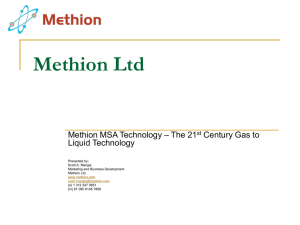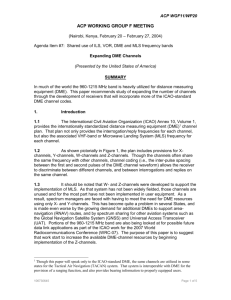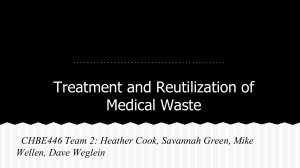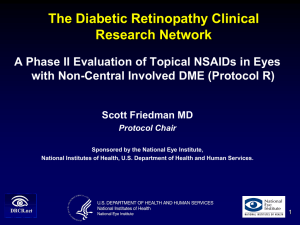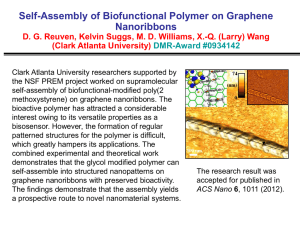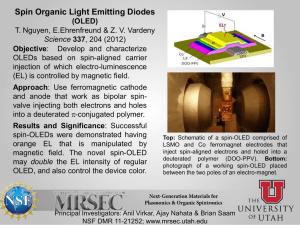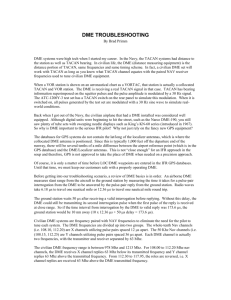Development in TIPS RAS of novel advanced processes for
advertisement
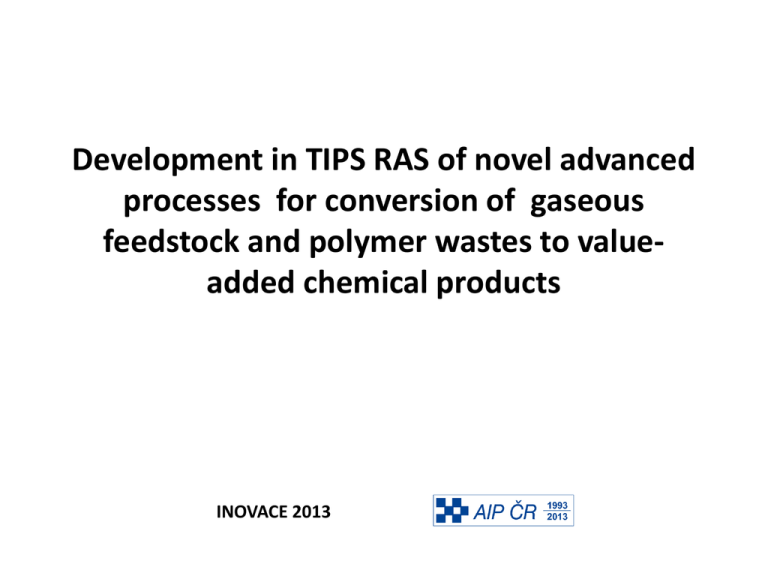
Development in TIPS RAS of novel advanced processes for conversion of gaseous feedstock and polymer wastes to valueadded chemical products INOVACE 2013 Innovation technologies for unconventional chemical feedstock transformation 1. New technology for synthesis gas production 2. New technology for production of olefins or gasoline from natural , associated or biogas 3. New technologies for synthesis gas transformation in slurry systems 4. Novel processes for polymer waste to fuel transformation OXIDATION OF NATURAL GASES TO SYN-GAS IN REACTOR SYSTEM WITH FEEDING OF OXIDANT AND HYDROCAARBON IN DIFFERENT REACTORS Regenerator Natural or associated gas, Biogas Syn-gas formation reactor H2 + CO (syn-gas) Metal oxide (MeO) Metal (Me) Conversion hydrocarbons in syn-gas: CnHm + nMeO → nCO + ½m H2 + nMe CO2+CH4 = 2CO+2H2 Catalyst regeneration: O2 + 2Me0 → 2MeO Nitrogen ADVANTAGES OF NEW TECHNOLOGY OF SYNGAS PRODUCTION: Air •44 % less capital costs and 16% less syngas production costs in comparison to traditional steam reforming; •Processing of associated petroleum gas with a wide range of C2-C4 hydrocarbons and CO2 into synthesis gas ; •Using air as an oxidant without dilution of syngas with nitrogen; •Elimination of the formation of explosive oxygen-hydrocarbon mixtures; •Low rate of catalyst deactivation due to coke removal during regeneration; •Production of considerable amounts of pure nitrogen 3 DIAGRAM OF OLEFINS (ETHYLENE AND PROPYLENE) SYNTHESYS TIPS RAS NEW NANOSTRUCTURATED CATSLYST BASED ON ZSM-5 NATURAL GAS Men+ Men+ 0,5-0,7 ть SYNGAS DME synthesis Men+ Catalyst production on Industrial scale Olefins production PROPYLENE (TILL 60%) ETHYLENE (TILL 40 %) The 2600 м3 of natural or associated gas gives 1 t of olefins Gasoline or naphtha production The yield of gasoline is 40- 50000 t per 1 mln. m3 of gas. 4 DESIGN OF PILOT PLAN РДС-4 FRC P РРГ-1 Синтез-газ Сдувка на факел 1 Т-23 Т-22 ВЗ-89 F РГ-1 P 1/2 ВТР-87 ВТР-86 2/2 T 3/5 ВЗ-19 Т-54 ВЗ-36 AC Р ВЗ-82 Ч-28 На анализ На второй реактор при увеличении производительности T 5/4 T вода P T ВЗ-20 Т-16 ВЗ-22 AC Ч-25 На анализ ВЗ-80 ВЗ-31 ВЗ-81 8/4 На анализ ВЗ-17 ВЗ-27 газы регенерации 6/5 9/4 Водород / азот / кислород L L ВЗ-24 Т-15 ВЗ-25 5 ВЗ-26 Вода Т-29 ВЗ-38 Ч-19 ВЗ-79 ВЗ-23 Т-14 L 10/4 ВТР-37 вода На анализ ВЗ-21 ВЗ-33 Конденсат Смесь оксигенатов 6 2 3 7 5/5 ВЗ-90 L ВЗ-32 Ч-26 Ч-17 L 4/2 P Олефинсодержащий газ T 6/4 5/2 Водород / азот / кислород РДС-2 Т-13 вода в вентвыброс ВЗ-28 AC ВЗ-18 ВЗ-35 Т-24 AC вода Т-55 AC 4 7/4 Р ВЗ-88 4/5 РДС-3 3/2 Process Convers ion Olefin esynthesis Катализатор Т,оС % Пиролиз 70 - 1000 >99 Mobil 50-70 ZSM-5 350400 UOP/Norskhydro 70 SAPO-34 Lurgi (DME) 70 Van (DME) DME TIPS Dijk >80 С2-С4 olefins, % Selectivity С2= С3= 47 31 17 47-75 26-56 7-24 20-28 450 До 100 75-90 38-50 32-36 ZSM-5 430450 99 >69 0 70 SAPO-34 450 70 49 70 0 ZSM-5 340450 95100 80-88 30-50 20-47 THREE-PHASE SYSTEM SLURRY TECHNOLOGY Catalysis in three-phase systems (slurry technologies) 15 mV 10-50 7 Газгольдер H2 6 1 M M M 10 К 2 5 Буферная емкость 12 9 H2O N2 CO H2 11 3 1 Catalyst productivity – 0,14-0,67 kg/kg(kat)*h . Olefins production DME conversion : 73% mass. Selectivity on C2-C6: >80% mass. Ethylene + Propylene : 95% 14 К M 13 4 DME production Conversion СО: 30-56% mass. Selectivity on DME: 91% mass. DME in product : 95% На сброс 8 17 Combination of homogeneous and heterogeneous catalysis advantages + Heat and mass transfer from the catalyst grain by the liquid medium +Use of undiluted feed 16 0-100 deg Polymer wastes for production of motor fuels and petrochemical feedstock Oil fractions Motor fuels Mixing (dissolution) Dissolved (solubilized) wastes Polymer wastes Polymers and polymer wastes: Polyethylene (PE); Polypropylene (PP); Polystyrene (PS); Poly(ethylene terephthalate) Oil fractions: Light gas oil; Heavy gas oil; Vacuum distillate Catalytic cracking Feedstock for petrochemistry MAIN ADVANTAGES - Surplus production of motor fuels and petrochemical products; - Relatively low capital costs due to potential of application of the technology at existing catalytic cracking units
